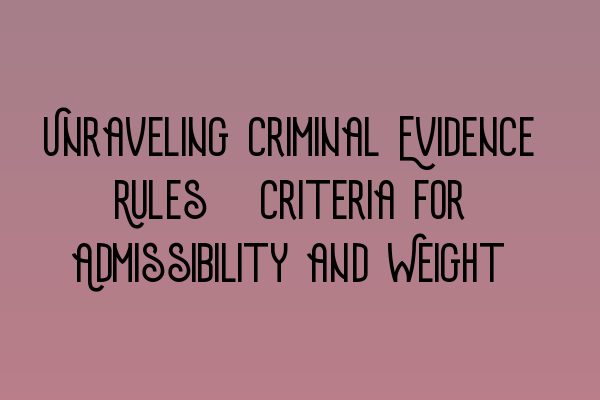Unraveling Criminal Evidence Rules: Criteria for Admissibility and Weight
When it comes to criminal proceedings, the admissibility and weight of evidence play a crucial role in determining the outcome of a case. The rules surrounding the admissibility of evidence can be complex and require a thorough understanding to navigate successfully. In this article, we will explore the criteria for admissibility and weight of criminal evidence, giving you a clear understanding of how these factors can impact a case.
The Importance of Admissible Evidence
Admissibility is a fundamental concept in the criminal justice system. All evidence presented in court must meet certain criteria to be deemed admissible. Admissible evidence is crucial for proving the guilt or innocence of the accused and ensuring a fair trial. Failure to adhere to the rules of admissibility can result in evidence being excluded, potentially impacting the strength of the case.
Criteria for Admissibility
The criteria for admissibility vary depending on the jurisdiction, but some common factors include:
- Relevance: Evidence must be relevant to the issues in the case. It should directly support or refute a claim or fact that is in question.
- Reliability: To be admissible, evidence must be reliable. This means it must be trustworthy and accurate. The court will consider factors such as the source of the evidence, any biases or motivations of the witness, and the methods used to gather or analyze the evidence.
- Legal Requirements: Certain types of evidence may have specific legal requirements for admissibility. For example, confessions may need to be voluntary and made in accordance with the law to be admissible.
- Public Policy: In some cases, evidence may be excluded if its admission would go against public policy, such as evidence obtained through illegal means or privileged communications.
It’s important to note that the rules of admissibility are not set in stone. Courts have some discretion in determining whether evidence should be admitted, and the weight given to the evidence. This means that arguments can be made for admitting evidence that may not meet all the criteria but is still considered reliable and relevant to the case.
Evaluating the Weight of Evidence
Once evidence is deemed admissible, its weight is evaluated. Weight refers to the probative value or persuasiveness of the evidence. In other words, how strong or credible it is in supporting or refuting a claim. The weight of evidence is determined by:
- Corroboration: Evidence that is supported by other evidence is generally considered stronger.
- Credibility: The credibility of witnesses and the manner in which evidence is presented can impact its weight. Factors such as inconsistencies, biases, or untrustworthiness may reduce the weight given to the evidence.
- Expert Opinion: Expert opinion can carry significant weight in certain cases, especially when it comes to complex scientific or technical evidence.
It’s worth noting that the weight of evidence is ultimately determined by the trier of fact, be it a judge or a jury. Their role is to evaluate and weigh the evidence presented before reaching a verdict.
Understanding the rules of admissibility and weight of evidence is crucial for criminal practitioners. It ensures that evidence is presented effectively and complies with the relevant rules and procedures. By understanding how to navigate this complex area, solicitors can build strong cases and improve their chances of success in court.
If you’re preparing for the Solicitors Qualifying Examination (SQE) and need essential study materials, be sure to check out our related article: “SQE Exam Prep: Essential Study Materials for Aspiring Solicitors”. We also have an informative article on the format of the SQE exam: “Demystifying the Solicitors Qualifying Examination Format” for those seeking a deeper understanding of the exam structure.
For international lawyers preparing to take the SQE exam, we have a dedicated article on the challenges and success strategies: “SQE Exam for International Lawyers: Challenges and Success Strategies”. Additionally, if you’re an entrepreneur in the UK looking to form an LLC, don’t miss our step-by-step guides on LLC formation: “LLC Formation Made Simple: Step-by-Step Guide for UK Entrepreneurs” and “LLC Formation: A Step-by-Step Guide for UK Entrepreneurs”.
